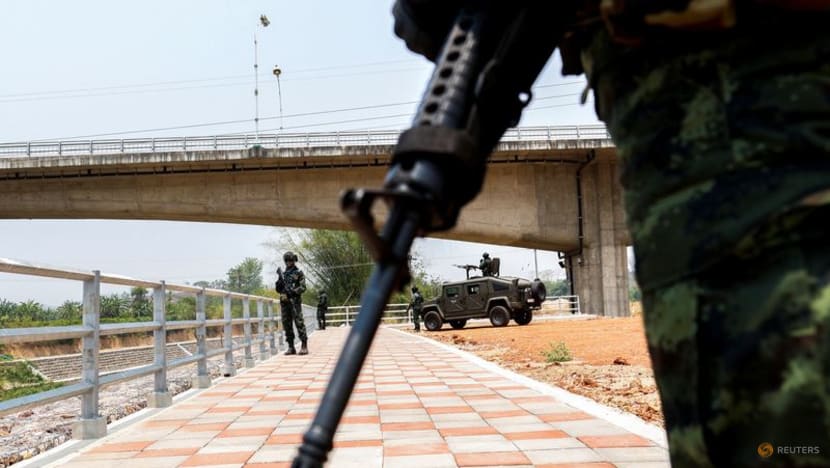China and ASEAN need to work together on Myanmar crisis: Observers
Beijing, for its efforts, has been unable to hold Myanmar’s military or armed groups to a ceasefire brokered in January.

Myanmar military personnel withdraw after a days-long assault by rebel forces that captured the town of Myawaddy, near the Thai-Myanmar border in Mae Sot, Tak province, Thailand, April 11, 2024. (Photo: REUTERS/Soe Zeya Tun)

This audio is generated by an AI tool.
China appears to have become one of the most influential stakeholders in Myanmar’s political crisis, having brokered a ceasefire deal among warring parties in January.
However, as pockets of fighting continue, observers said Beijing has its limits and the Association of Southeast Asian Nations (ASEAN) needs to play a bigger role in mediation efforts.
Dr Brian Wong, a fellow at the University of Hong Kong's Centre on Contemporary China and the World, said a coordinated approach between China and the regional bloc, particularly Thailand – which Myanmar shares a border and enjoys close ties with – could bear more fruit in facilitating the peace process.
“If China wants to bring peace to the region, it needs to get other stakeholders including ASEAN on board as opposed to coming across as a unilateralist power moving in and trying to influence and shape the domestic politicking within Myanmar,” Dr Wong told CNA’s East Asia Tonight on Wednesday (Apr 17).
“As important as China is with its economic presence and trade and investment flows, the fact of the matter is that the Tatmadaw has enjoyed long-standing ties with the Thai military.” The Tatmadaw refers to Myanmar's military.
WHERE ASEAN HAS FAILED
The regional grouping has been struggling to play the role of key mediator since the conflict began more than three years ago, when Myanmar’s military junta seized power in a coup.
ASEAN’s success banks heavily on Myanmar’s implementation of the Five-Point Consensus, a peace plan agreed upon by all leaders of the bloc, which includes an immediate cessation of violence, constructive dialogue, and provision of humanitarian aid.
The consensus has so far been a failure, with the junta refusing to meet the commitments.
With new Thai Prime Minister Srettha Thavisin, experts said there are signs Thailand could be reconsidering its Myanmar policy and taking on a more active role.
“Under the new administration in Bangkok, we've clearly seen a more proactive diplomatic approach and a willingness to play a more neutral role as a mediator and peacemaker,” said Dr Wong.
Beijing, for its efforts, has been unable to hold Myanmar’s military or armed groups to the truce. Sporadic fighting has escalated in recent weeks, prompting China to hold air defence and live-fire drills near its border with its neighbour.
CHINA’S MEDIATION EFFORTS
In January, alarmed at the spillover of violence when five people were hurt in its southwestern province of Yunnan after an artillery shell crossed from Myanmar, China brokered the ceasefire deal between the military and an alliance of ethnic minority guerrilla groups.
One of Myanmar's strongest allies, Beijing has connections with the key players in the conflict, including the junta, ethnic armies, the civilian National Unity Government, and Aung San Suu Kyi's National League for Democracy party. It is also close to Laos, the current ASEAN chair.
This puts Beijing in a prime position for peace efforts, said observers.
“China is not just playing a facilitating role, but a mediating role. China has more influence than any other stakeholders, and has leverage on all the stakeholders,” said Mr Amara Thiha, a researcher from the Peace Research Institute Oslo.
He added China needs a stabilised Myanmar to protect its interests and investments in the country.
“China’s mediation in Myanmar is not just about protecting its economic interests, it's of strategic interest in the longer term… (to prevent) a power vacuum where external actors, Western actors could come in,” he said.
Dr Digby James Wren, senior advisor at the Royal Academy of Cambodia’s International Relations Institute, said Beijing has sought to avoid taking explicit sides in the conflict, choosing instead to mediate with all parties.
“China is looking for the least friction possible. It wants (the situation) to be as stable as possible. I don't think that the Chinese government is actively supporting any activities against the Myanmar government, but I don't think that they're giving as much support as they might have given before,” he said.
















